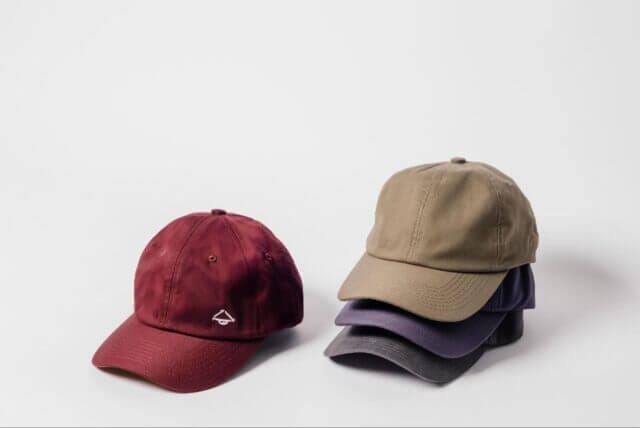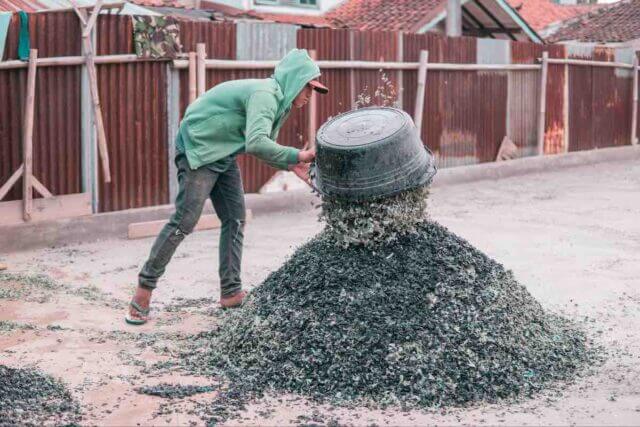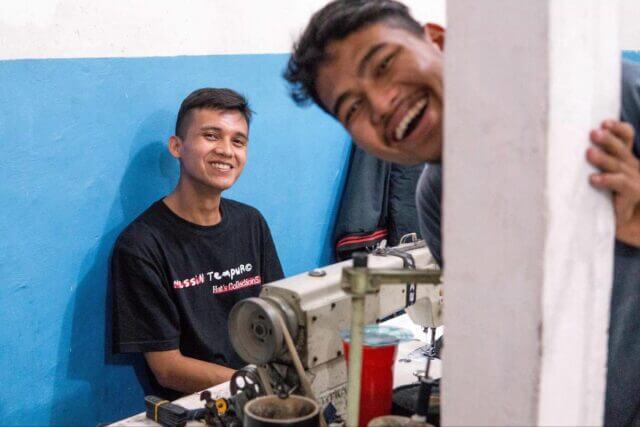
Indonesia is a place where our nature thrives on every inch of our nutritious soil, every breath of crisp air, and every sip of crystal clear water. At the same time, my country is also home to one of the biggest textile industries and exporters. If not handled well, the industry would severely pollute our archipelago wonders and ruin our livelihood.
But when there’s an obstacle, there are also seeds of hope. The very same hope is something that most folks nurture in times of catastrophic events like climate change. From hope, one could leap into a thoughtful action or positive attitude.
Tak kenal maka tak sayang. This popular Indonesian proverb means you can’t be in love and deeply care about something unless you know it better. A lot of Indonesian youth these days are quite eco-conscious about loving and taking care of the earth better.
Topiku’s founder Monty Hasan is one of them who put his visions of a greener Indonesia and ethical industry into reality. I had the honor to interview with my peer on this matter.
Q: Why did you start Topiku?
Monty: I am Indonesian American. My parents were both born in Jakarta, and I was born in the US. As a mixed kid, I spent most of my life studying in the US, but every summer, I would always go back to Indonesia to visit my family.
I think a notable issue I was aware of growing up was how much disparity there was with waste management systems between California and Jakarta. If you’ve visited Jakarta, it’s quite apparent to see how concerning the waste management issue is; it doesn’t take long to see single-use plastics littered on the streets and in nature.
When I was still in university, I spent a summer in Jakarta volunteering at a non-profit that introduced me to the concept of upcycling. It was during this experience that I found inspiration to create products from upcycled materials. . In my opinion, upcycling allows materials to have a second life, repurposed and re-envisioned into products that have utility.
For me, I was really curious about using the leftover materials from the waste byproducts of industrial processes and exploring how that waste and leftover materials could be repurposed into a new product. A lot of the motivation behind Topiku centers around landfill diversion: procuring and salvaging materials before they end up polluting our environment in a landfill.
I never planned on becoming an entrepreneur. In college, I majored in Geodesign, and I had a minor in architecture. My studies essentially focused on sustainable city planning, and Topiku was always just a side hustle – I was still in college as a student when we started in 2015. I had no expectation it would become my full-time job, but over the years, especially upon graduating, we started to build a lot of traction. With no other job prospects during the pandemic, I decided to focus on Topiku full-time.
Sustainability consists of the 3 P’s: People, Planet, and Profit. These 3 aspects are the foundation for our direction and strategy as a social enterprise. I would say our biggest impact now is our social mission, which is to support our artisans, providing them with ethical working arrangements and environmentally responsible materials. As we cater to an international market, we provide a lot more stable financial security for our artisans, with much more resilient demand than just the local Indonesian market.
Q: How did you personally get into sustainability?
Monty: I got into sustainability because again, growing up between Indonesia and California, I was exposed to the disparity between their waste management systems. In California, waste management isn’t something you ever really need to think about: Every week, you have weekly garbage pickups where you roll your black and blue bins to the side of the street for collection. In general, in California, trash isn’t really something you have to overthink.
And then when you get to a city like Jakarta, you see how different the waste management systems are. There are Pemulung (Indonesian word for an independent trash picker), who collect waste daily. It’s a lot less formalized of a system compared to the government-subsidized collection that occurs in other cities. In this day and age in, they do exist in Jakarta. But it’s still not as widespread as what you see in California. I do believe Jakarta and Indonesia still have a long way to go to get to where the waste management systems can keep up with the societal need.
To get there, we need a lot more local players. Topiku can’t single-handedly tackle this problem; we recognize that we are part of an ecosystem of players within Indonesia. This is a communal movement, and I’m happy to see the community of impact players continue to grow every year.
Creating a nationwide, or an industry-wide change, requires a lot of cross-collaborations and localized impacts. Topiku is an exploration of setting a new standard through responsible business practices. We’re firm believers that to influence the mindset of industry players, a business must first show that being sustainable can be financially beneficial. This is now our ninth year of operations. I think that’s why our wholesale program has been our main source of revenue for the last five years, as we have been able to leverage our transparent and traceable supply chain.
We’re very open and communicative with how we work together with our artisans. By sharing our story for other brands to collaborate with for their own custom headwear, we’re helping to lower their carbon footprint, provide financial security for our artisans, as well as teach them that sustainable products made from recycled, upcycled, or repurposed materials have a lot more benefits than the standard, non-recycled hats they are typically produced. So that’s a big part of why we’re in sustainability: to be industry leaders and role models. To show that responsible business practices can be a catalyst for systemic change through education and awareness building.

Q: What does sustainable mean to you?
Monty: Well, I think the dictionary definition of sustainability is really about being able to sustain something, whether it’s a lifestyle, the environment, and a lot of that comes down to security. Sustainability helps to guarantee that we can maintain our lifestyle and our systems together instead of simply an extractive type of process, which is the industry norm at the moment. It’s very short-term oriented, and does not consider the long-term consequences of business decisions.
Sustainability when it comes to resources is more about how we can conserve the resources we have and replenish them without simply consuming our finite supply. Sustainability is just a starting point, I would say the greatest goal to reach for is regenerative or circular methods. Sustainability is a stepping stone to achieving that circularity, in addition to beginning to close the loop.
Another aspect of sustainability is leadership. For example, as first movers, we have published the world’s first carbon footprint report for a baseball cap. As far as we know, no one else has yet to publicly release that data. In 2022, We were the first to publish our Life Cycle Assessment for our best-selling baseball cap model. Part of the reasoning behind this initiative is to openly share the data that goes into our sourcing and production methods. In the journey to becoming circular, data allows action plans to be formed.
Our report included scope 1, 2, and 3 emissions from our supply chain to the product’s end-of-life. Again, for us, , sustainability cannot just be claims; they’ve got to be data-backed. That’s why transparency and traceability is so important within sustainability. I’m aware that’s something that Garik talks a lot about on Eco-Stylist, and he asks some great questions when it comes to the traceability and how transparent these brands are when they advertise themselves.
That’s a similar mindset to how we strive to be. Naturally, it’s a kind of balancing act when it comes to transparency. At the end of the day, you do need to think from a business mindset, and there are certain strategies you do need to implement to make sure you can protect your own viability as a company while maintaining transparency. That’s something that I think all companies need to explore.
Q: That’s astonishing, so you’re really the first one to publish the carbon footprint report?
Monty: We’re the first to publish it publicly in 2022. We worked with an independent 3rd party carbon footprint consultant. Data gathering for us took approximately one whole month, as we wanted to review how our footprint compared to a standard, non-sustainable baseball cap. Sadly, During this search, we could not find any public data regarding the carbon footprint of a standard hat. Understanding that no one had yet to post it was a huge motivator for us to release the information.
Q: I am aware that the greater Bandung district is a popular place for the clothing industry in Indonesia, but where does Topiku specifically manufacture its hats? Is there anything different from other manufacturers in Bandung? And why did you pick that place?
Monty: For our hat manufacturing, for the last 9 years, we have exclusively worked together with one community in Rahayu, Cigondewa, Indonesia. Within these manufacturing areas in Indonesia, a lot of these villages and areas will be specialized in one specific type of product manufacturing. The discovery of the community in Rahayu was an accident back in 2015. My mindset originally was solely about the environmental aspect of sustainability: Collecting leftover materials, collecting deadstock fabrics, upcycling leftovers, recycling plastic.
As I was still a college student in 2015, I was not that well-versed about the social impacts of fashion. I did some research and I planned a visit to a factory I had found online. While on the way to this factory,it started rain heavily. Here I was, stuck a few hours outside of Jakarta, lost in a random desa (Indonesian term for village). The rain was too heavy, and it would not have been possible to reach the original factory. We decided to stop in this village and ask for directions. Luck would have it: as it turned out to be a hat manufacturing village. . This community of Rahayu is the same community of artisans we have worked with for over 9 years. It was a very fateful and chance encounter that we met, enabling us with a powerful social mission to match our environmental initiatives.
When it comes to the mindset of local home industries, there is a perception of leftover materials as low-value. We sought to reframe things for them as we were salvaging leftovers before they were disposed of, showing them there was demand for recycled products in the international market, especially since we were primarily selling in the US.
Although there was demand for these repurposed products, it takes a lot of time to be able to build trust within a manufacturing relationship. That is something that we take pride in: we believe we accomplish this mutually beneficial relationship more successfully than the majority of fast fashion companies. It’s a common standard in the fashion industry to have very confusing payment terms. While some companies say that they’re paying their suppliers on time, a closer examination may show that the supplier may not be paid on schedule.
That’s one agreement we have with our artisans: helping to set beneficial trade terms that include advance payments for productions upfront. For context, our artisans typically produce for the local, pasar (Indonesian terms for market) or the local markets, with lower quality hats. During the pandemic in 2020 to 2021, when they were still producing these cheap, low-quality hats, sadly, all of the demand in the local markets disappeared. Rather than panic, our artisans realized Topiku offered a more resilient market to cater to.
This financial security enabled a deeper understanding and support for our mission amongst our artisans. They began to see the value of sustainable products because, throughout the pandemic, we were able to provide steady work, where other vendors struggled. From our inception, our artisans have always acted both as partners and beneficiaries, who understand our mission. It is the first step to setting new standards within this industry. It allows for further initiatives such as waste management education and collection within their communities. Again, It takes a lot of time to establish these programs, and we’re not going to pretend like we have fixed everything. It is an ongoing journey that’s part of our mission as a social enterprise.
One clear thing that has changed with our artisans over the years is their belief in sustainable products and the benefits of responsible production. They are very close partners of ours. That is our competitive advantage.

Q: Next, what sets the brand apart from other companies? What makes it the most sustainable hat?
Monty: I’d say the main thing is that our initiatives go beyond just our supply chain. So one of our core missions is to only use upcycled, recycled or repurposed materials. There are a lot of sustainable alternative materials on the market now, but we’re firm believers that the leftover waste byproducts of one industry can become the inputs for another industry.
For us, when it comes to our hats, we use a lot of deadstock from curtain manufacturers. For our plastic components, we do our best to recycle the HDPE for our visors. We use recycled metal for our buttons and clasps. The fascinating thing about these recycled plastics and recycled metals is that we can’t take credit for this ingenuity; A lot of these artisan home industries are already innovating using these recycled materials.
Our role is more about how we work together to improve product quality because recycling, although great for the environment, is not the perfect solution. Quality from recycling tends to degrade over time which is why we make sure to work with our artisans or our suppliers to experiment on a more durable and longer product life cycle.
Beyond that, we are also a certified B Corporation, Climate Neutral, and are members of 1% for the Planet. We go above and beyond our commitment for 1% for the planet initiatives and have donated a value of 4% of our annual revenue over the last 3 years to various nonprofit initiatives. Furthermore, we have also offset 10 times the amount of our carbon emissions since 2020.
Some companies may focus solely on carbon offsets, which in my opinion, is just “putting a band-aid” on the problem – it doesn’t actually make the greatest impact or solve any problems. We do believe in offsets, but we also believe in carbon mitigation, which can only happen from the supply chain. That’s a big part of why we published our carbon footprint report. Being the first to publish this carbon footprint report, backs our claims with data, which is something that we take pride in accomplishing.
This data is a big reason why we’re able to work with companies from around the world. This amount of transparency and traceability can be challenging to find in other custom hat manufacturers.
Q: What’s the next step for Topiku?
Monty: Our next step is to continue to work on our supply chain. We are a small company and are currently growing the team, so being able to properly focus on all of our upcoming programs requires proper focus. We do get asked all the time if we plan to create other products. But with the current standard that we have established with headwear, we want to make sure to meet that same quality with other products we develop.
The next initiative we’re developing is the creation of our own proprietary materials for these recycled or sustainable hat components that can be utilized by other manufacturers.
We are aware that recycled plastic may not be the best solution in the long term, so, we are experimenting with other types of biodegradable materials that could work as future substitutes.
While we are a sustainable social enterprise, we’d like to push for more circularity and close the loop. While that may take a while, we’re firm believers in setting targets and maintaining accountability through various third-party certification bodies, we can achieve this goal.
Q: What excites you about the future of sustainable fashion?
Monty: Over the years, I’ve done talks and presentations at universities in Indonesia. What gets me the most excited is, the more I do these talks, the more optimistic I get about the next generation of changemakers. I’m very excited to see the current generation of Indonesian college students, who very clearly express their passion towards creating a greener future.
That gives me a lot of hope. From my experience, the ones who ask questions during these presentations are a lot of brave, confident, educated women, who I can tell are ready to create their impact. In a country like Indonesia, that means a lot to me.
Q: Final question. What is one word that you believe best describes Topiku?
Monty: I would say one word that best describes Topiku is security.
What does security mean? To me, it means peace of mind. I believe any sustainable company needs to offer security. A lot of what people seek out is a guarantee of predictability. Security for us is the security of knowing who made the products. Security is what materials go into the product. Security is where our money went to help support the initiatives. All of this security comes from traceability and transparency.
It’s the security of how a customer purchases, and how our company impacts the planet. It’s the peace of mind and not needing to second guess a decision. It’s the security to know and trust us, especially as custom hat manufacturers, that our clientele can depend on in the long run. They can have security trusting our goal of working towards a responsible future that may not be as clear as with other companies. So again, it’s the security of making a positive impact. That is what describes Topiku.
*Monty Hasan is the CEO and co-founder of Eco-Stylist certified brand, Topiku. Topiku is paving the way as a prominent eco-conscious hatmaker in Indonesia.
Topiku, if we are to translate it directly, means “my hat” in English. Monty’s Topiku isn’t as self-serving as the name’s translation suggests; Topiku focuses more on the bigger picture of our people’s lives, from social impact to environmental conservation. Who would ever guess that a small start would become a defining game-changer?
Want to Support Topiku?
You can shop their ready to wear hats on their website. And as a bonus for our readers, use discount code ECOSTYLIST10 for 10% off any order.
Who’s Next?
At Eco-stylist we want to support industries that uphold our values towards the environment and ethical treatment towards workers. Your fashion can be both eloquently chic and eco-conscious.
That’s why we’re highlighting brands with great style and great stories. Eco-Stylist approved brands give you the comfort of knowing your clothes were made ethically and in a more environmentally responsible way. Furthermore, they’re helping to drive change in the industry.
Let us know which ethical brand we should interview next. Vote in the comments and we’ll pick one brand for an upcoming article!

Nanda is an Indonesian freelance writer, content maker, and blogger, specializing in sustainable fashion, art, music, literature, and entertainment.










2 thoughts on “Changing The Game With Topiku: The Most Sustainable Hat”
Great article! Inspiring mission & great insights into Topiku’s journey & processes. Thanks
Thanks Anne!